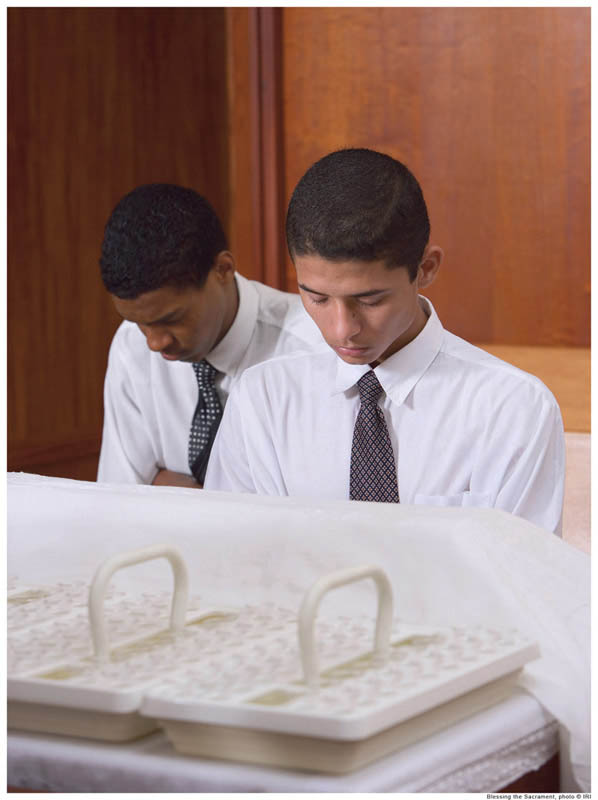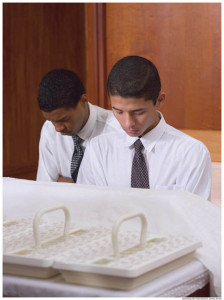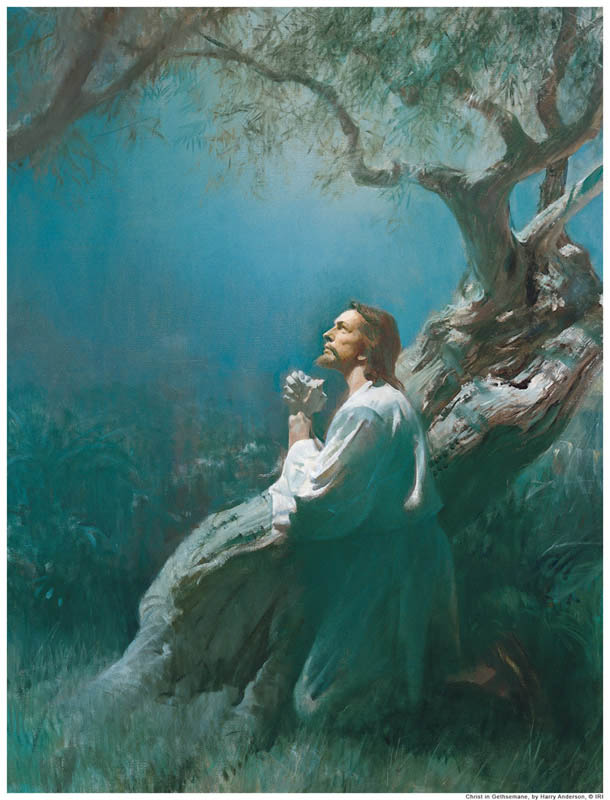Every Sunday, Mormons meet together in their chapels for Sacrament Service. While it is a basic worship service, the most important purpose is the taking of the Sacrament, which is what Mormons call Communion. Mormon is a nickname for members of The Church of Jesus Christ of Latter-day Saints.
 The purpose of the Sacrament is to remember the atonement of Jesus Christ. Mormons do this in a very quiet sort of way that begins with the congregation singing a Sacrament Hymn while teenagers prepare the Sacrament of bread and water. A look at some of these hymns can be an enlightening way to find out how Mormons look at the atonement. Since hymns are copyrighted, you can read the full hymn on the official LDS website and even listen to it sung.
The purpose of the Sacrament is to remember the atonement of Jesus Christ. Mormons do this in a very quiet sort of way that begins with the congregation singing a Sacrament Hymn while teenagers prepare the Sacrament of bread and water. A look at some of these hymns can be an enlightening way to find out how Mormons look at the atonement. Since hymns are copyrighted, you can read the full hymn on the official LDS website and even listen to it sung.
While of These Emblems We Partake
This hymn does an excellent job of outlining the purpose of the Sacrament in Mormon theology. The first verse tells us that while we are taking the bread and water (water being a stand-in for the more traditional wine), we are to think about the atonement of Jesus Christ. We are not to mindlessly take it when it’s given to us by the young boys who bring it to the members of the congregation. Instead, we are to evaluate our own lives and make sure we are “clean and pure.” Mormons consider the Sacrament a time to renew the covenants (promises) made at baptism and so, just as they did before their baptism, they evaluate their lives to determine what they might need to repent of. They then renew their commitment to follow Jesus Christ in their lives.
The second verse explains what the atonement is: “For us, the blood of Christ was shed.” The atonement, to Mormons, is a very personal sacrifice. Mormons believe that in the Garden of Gethsemane, Jesus took on the individual sins of each individual person, a process so painful he required assistance from an angel to get through it. He even asked God to remove the suffering, but only if it was God’s will—and he knew it could not be because the atonement was an essential part of God’s plan.
In order for us to return home to God, we would, according the law mentioned in the third verse of this hymn, need to live a completely perfect mortal life. This, of course, was impossible for anyone who was fully human. It was for this reason Jesus Christ volunteered to come to earth, half mortal and half divine, to satisfy the law, but to temper it with mercy. As the literal Son of God, He was able to choose to live a sinless life and as the mortal son of Mary, He was able to experience the trials and temptations of mortality.
Only Jesus Christ could be killed—a sacrifice He willingly accepted—and then overcome death through resurrection. This is discussed in the final verse, where we learn that because Jesus Christ was resurrected, we too can be resurrected and live forever.
Mormons believe the atonement process was not limited to the cross. While many religions seem confused about the purpose of the Garden of Gethsemane, Mormons consider it to be a sacred place in which the Savior took our sins on Himself. This is why the suffering was so extraordinarily intense—not because He was sad or worried about His impending death, or because He was afraid Satan would take Him before He reached the cross, but because He was coping with the effects of our sins. This powerful gift of love was evident in the events of the Garden, and knowing they were an actual physical event, and not just part of the death process gives us a more powerful evidence of His love. He took each sin on Him and paid the price for it—not a group deal, but each one individually. This was a personal gift especially for each one of us individually, since it was our own personal sins He dealt with at some point in the process.
The cross was also a critical part of the process. A Mormon sacrament hymn discusses the purpose of the cross in Mormon theology:
This brief hymn tells us the sacrifice made in Gethsemane was sealed with Jesus’ blood when He died on the cross. This death on the cross was a critical turning point in God’s plan for us. Instead of death being the end, it could now be a beginning. Three days after Jesus died, He was resurrected. Had He remained dead, the entire New Testament would be without meaning. The Savior’s resurrection showed us that it was indeed possible to live forever. Jesus broke the bands of death not just for Himself, but for everyone. Through the atonement, death, and resurrection of Jesus Christ, we all live again.
Mormons believe the atonement gave us several completely free gifts, so free they don’t even require belief in Jesus Christ. Through God’s grace, everyone is resurrected and will live forever. Repentance is now possible because the sins had been atoned for. What is known by many churches as the “original sin” no longer taints us and we are accountable only for our own sins. Children and babies who die must not suffer for actions over which they had no control. Through the atonement of Jesus Christ, babies and young children too young to accept Jesus Christ as their Savior or to be accountable for sins are taken directly home to God if they die. Those who die without a knowledge of the gospel will have a fair chance to be saved.
Mormons believe that to activate the full measure of the atonement, one must accept Jesus Christ as his or her personal Savior and then be baptized. These acts or works are mandated in the Bible. The Bible also warns us we must keep the commandments if we want to live directly in God’s presence—do we really want to spend eternity with wicked people? Should they be entitled to God’s presence? Our actions can’t save us—the atonement saved us. However, saying we accept Jesus Christ as our Savior does not give us a license to do whatever we want from then on. Our obedience, when done in a spirit of love for God, is the measure of just what our Christianity really means to us. If we say we love God, but then intentionally and happily sin, our love is not deep enough and our conversion is not complete enough. Actions done purely for reward are meaningless and have no power, but obedience done in love is part of the true Christian lifestyle:
21 Not every one that saith unto me, Lord, Lord, shall enter into the kingdom of heaven; but he that doeth the will of my Father which is in heaven (Matthew 7:21).
15 If ye love me, keep my commandments (John 14:15).
Jesus was asked by a young man what he had to do to be saved. Jesus didn’t give him words to say—He gave the young man commandments to keep. When He learned the young man already kept those commandments, Jesus raised the bar to see if the young man was so anxious to be saved, so filled with love for God, that He would be willing to do anything He was asked. The results were telling:
16 ¶And, behold, one came and said unto him, Good Master, what good thing shall I do, that I may have eternal life?
17 And he said unto him, Why callest thou me good? there is none good but one, that is, God: but if thou wilt enter into life, keep the commandments.
18 He saith unto him, Which? Jesus said, Thou shalt do no murder, Thou shalt not commit adultery, Thou shalt not steal, Thou shalt not bear false witness,
19 Honour thy father and thy mother: and, Thou shalt love thy neighbour as thyself.
20 The young man saith unto him, All these things have I kept from my youth up: what lack I yet?
21 Jesus said unto him, If thou wilt be perfect, go and sell that thou hast, and give to the poor, and thou shalt have treasure in heaven: and come and follow me.
22 But when the young man heard that saying, he went away sorrowful: for he had great possessions.
The young man could speak easily of belief and faith, but Jesus showed the man this was not enough—His actions must match his words. The young man was sad to realize he did not love God enough to give up His possessions. He was not willing to let his works match his words.
Mormons, then, do not believe you can “work” your way into Heaven. They believe your actions are a manifestation of the depth of your faith—when they are done for the right reasons, and the only right reason is love for Jesus Christ.
Two prophets in the Book of Mormon, which Mormons use with the Bible, explained this complex idea:
Wherefore, how great the importance to make these things known unto the inhabitants of the earth, that they may know that there is no flesh that can dwell in the presence of God, save it be through the merits, and mercy, and grace of the Holy Messiah, who layeth down his life according to the flesh, and taketh it again by the power of the Spirit, that he may bring to pass the resurrection of the dead, being the first that should rise. (2 Nephi 2:8.)
32 Yea, come unto Christ, and be perfected in him, and deny yourselves of all ungodliness; and if ye shall deny yourselves of all ungodliness, and love God with all your might, mind and strength, then is his grace sufficient for you, that by his grace ye may be perfect in Christ; and if by the grace of God ye are perfect in Christ, ye can in nowise deny the power of God.
33 And again, if ye by the grace of God are perfect in Christ, and deny not his power, then are ye sanctified in Christ by the grace of God, through the shedding of the blood of Christ, which is in the covenant of the Father unto the remission of your sins, that ye become holy, without spot. (Moroni 10:32-33.)
About Terrie Lynn Bittner
The late Terrie Lynn Bittner—beloved wife, mother, grandmother, and friend—was the author of two homeschooling books and numerous articles, including several that appeared in Latter-day Saint magazines. She became a member of the Church at the age of 17 and began sharing her faith online in 1992.






